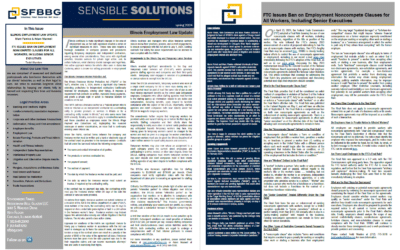Resources
Stay in the know of company and industry updates, accomplishments and more!
Protecting Your Brand and Your Wallet: Navigating Trademark Fraud Challenges
Fraudulent practices within the trademark industry have threatened brand owners for years, with scammers continuously refining their methods. Recognizable names such as WTP (World Trademark Publishing), TMP, WW Trademarks, Trademark Registro, and individuals impersonating attorneys or USPTO officers are among those behind these schemes.
Illinois Employment Law Update/FTC Issues Ban on Employment Noncompete Clauses for All Workers, Including Senior Executives (Spring 2024)
Contributors: Marc Pawlus & Adam Maxwell, Tedd Warden
Time is Money: Navigating the DOL’s Final Overtime Rule
On April 23, 2024, the Department of Labor published a Final Overtime Rule that amends the regulations established under the Fair Labor Standards Act (FLSA) governing exemptions from minimum wage and overtime pay mandates for executive, administrative, and professional employees, as well as highly compensated employees. The Final Rule is set to take effect on July 1, 2024 and includes built-in adjustments of compensation levels on a going-forward basis.
FTC Adopts Final Rule Banning Employment Non-Compete Agreements
On April 23, 2024, the Federal Trade Commission (FTC) adopted its long-awaited final “Non-Compete Rule,” (the “final rule”) imposing a comprehensive ban on the use of new non-compete agreements with all workers, including senior executives.
Loss Deductions on Gifted Property
Question: I am contemplating giving to my daughter stock which has decreased in value below my purchase price. Is my daughter entitled to a tax loss if she sells the property?
Q1-2024 Employment Spotlight
The U.S. Department of Labor’s new rule, effective March 11, 2024, aims to clarify worker classification under the Fair Labor Standards Act. It defines “independent contractor” based on economic dependence, utilizing a “six plus one” factor test. These factors slightly favor an employment relationship.
Federal Court in Alabama Rules the Corporate Transparency Act Unconstitutional
One of the newly enacted laws SFBBG has been following closely is the Corporate Transparency Act (the “CTA”), a federal statute that impacts the overwhelming majority of our clients. A discussion of the CTA can be found in our November newsletter.
Avoiding 5 percent owner status for retirement plan distribution purposes
Many individuals continue to work into their retirement years, whether due to financial need, personal desire or some other motivation. A meaningful portion of these workers are high-wage earners who pay tax at the maximum or near maximum income tax rates and do not wish to withdraw funds from their retirement accounts which in most cases are fully taxed at ordinary income tax rates.
Judge adds exemplary damages to verdict delivered by the “Windfall Gals”
The Fall edition of this Legally Speaking column reported on the verdict delivered in the summer of 2023 in favor of an ERA rep given the pseudonym Rigorous Electronics Performers, LLC or REP. A suburban Philadelphia jury found that Manipulating Financial Results, Inc. or MFR (also a pseudonym) owed REP over $600,000 in unpaid commissions.
Our New Legal World — Contactless Delivery of a Lawsuit / “Battle of the Forms” — A Primer (Winter 2024)
Contributors: Andrew Johnson, Caleb Haydon








